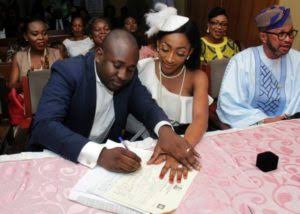Lifestyle
Civil Wedding In Nigeria: Procedure And Implications
Komomoh Ibiang

Civil wedding or Marriage under the Act or statutory marriage is a marriage that has been performed in compliance with the Marriage Act.
Civil wedding in Nigeria is very important because it is recognized by the law and also serves as an evidence of a marriage contract between a couple.
READ ALSO: How To Keep Warm During Cold Weather
This legal marriage is protected under the Marriage Act, Chapter 218 of Laws of the Federation of Nigeria 1990.
How To Go About Civil Marriage
All States have various Registries at the State and Local Government level and you will need to pay a visit to get the specific details of the requirements expected of you for a civil marriage, however, below are the general requirements as may be applied across the country.
Filing of marriage notice:
- Once you have decided to have a civil wedding, the intending bride or groom will obtain a form from their registry of choice to indicate their intention to marry. The form is FORM A
- You will also need to submit two coloured passport photographs.
- The form is then posted on the notice board.
After the expiration of the notice and payment of the Prescribed Fee (this differs at each registry), the Registrar would issue a Form C after the following criteria have been met and satisfied:
- That one of the parties has been resident within the district in which the marriage is intended to be celebrated.
- That each of the parties to the intended marriage (not being a widower or widow) is twenty-one years old, and if under that age, the consent hereinafter made requisite has been obtained in writing and is annexed to such affidavit (meaning you have to get written permission/consent from the bride-to-be’s parent or legal guardian).
- That there is not any impediment of kindred or affinity, or any other lawful hindrance to the marriage
- That neither of the parties to the intended marriage is married by customary law to any person other than the person with whom such marriage is proposed to be contracted.
Once the requirements mentioned above have been confirmed, the couple would swear an affidavit before the registrar or recognized minister of religion. During the sworn affidavit, the registrar would reiterate the above Prohibitive decrees and also explain the penalties involved.
Failure to disclose a breach in any of the above makes the defaulter liable to two years imprisonment.
Thereafter, the Registrar signs a declaration/affidavit to show that the couple understands the implications under the law and have met and satisfied all that has been required of them.
Upon proof that there is no lawful impediment to the proposed marriage, and that the necessary consent, if any, to such marriage has been obtained, the Minister will dispense with the giving of notice, issue the certificate, and grant his/her license, known as Form D, authorizing the celebration of a marriage between the parties named in such license.
The couple then selects a date for the wedding, usually within three months from the date the notice was placed with the registry.
On the wedding day, the couple alongside their family members and friends would go to the registry to finalize the marriage proceedings. There would be other couples that will also show up for their own celebration, and as such each couple is given a specific time that must be adhered to.
The ceremony is usually not longer than 30 minutes. During the proceedings, the Registrar would print the marriage certificates in duplicate and with counterfoils as in the FORM E. The officiating minister will fill up in duplicate a marriage certificate with the particulars required by Form E, and enter in the counterfoil the number of the certificate, the date of the marriage, names of the parties, and the names of the witnesses.
The certificate will then be signed in duplicate by the officiating minister, by the parties, and by two or more witnesses to the marriage. The minister having also signed his name to the counterfoil will deliver one certificate to the parties, and within seven days, thereafter file the same in his office.
The Registrar will then register the marriage in a book called the Marriage Register Book, every certificate of marriage filed in his office according to the FORM F… and viola! You’re married!
The civil wedding is by far the cheapest among the other types of marriage ceremonies in Nigeria, though it has got a longer process and all criteria must be met.
Send Us A Press Statement Advertise With Us Contact Us
And For More Nigerian News Visit GWG.NG
And For More Nigerian News Visit GWG.NG

